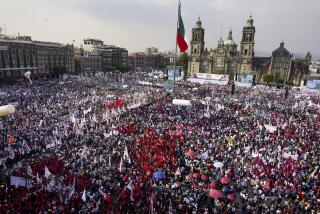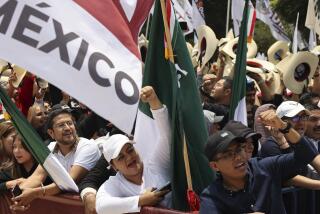Politics : Election Race May Be Test for Philippine Democracy : Many fear that much of the money spent to sway the May voting will come from unsavory sources such as criminals and drug lords.
- Share via
MANILA — President Corazon Aquino surprised many here recently when she corralled an unlikely coalition of Philippine senators behind her plan to offer the United States a three-year lease at Subic Bay Naval Base. How did she do it?
“We threatened them with clean elections,” one presidential aide explained with a grin. He paused, then added, “That’s a joke.”
Still, few are laughing as the Philippines prepares for elections May 11. With virtually every elected national, provincial and municipal office up for grabs, the day promises democracy run riot, with 70,000 candidates running in 165,000 precincts.
In all, 31 million voters will elect a new president to replace Aquino, who insists that she will not run again, plus a vice president, 24 senators, 200 members of Congress, 73 provincial governors and vice governors, 62 city mayors, 1,543 town mayors and thousands of provincial and municipal legislative council members.
Since candidates are expected to spend hundreds of millions of dollars--including a considerable portion to buy votes, if history is any guide--it promises to be the largest and most expensive election in Philippine history.
The race already is shaping up as a critical test of whether the newly restored and still-struggling democracy has finally outgrown its traditional reliance on the “three Gs” of Philippine politics: guns, goons and gold. Many say politics remains a blood sport here.
“This is now a Mafioso democracy,” said Alex Magno, an acerbic political analyst and professor at the University of the Philippines. “The next election will be decided by who is most liquid: the smugglers, the gambling syndicates and the drug lords.”
Indeed, many here fear that traditional sources of political fund-raising, such as contributions from corporations and sugar barons, are fast being overtaken by less savory means, including a recent rash of kidnapings, bank robberies and extortion. That means less influence for traditional power bases, including the Roman Catholic Church and the military.
“We’ve pulled away, mercifully, from the landed oligarchy that always ran the Philippines,” Magno said. “We’ve moved, unfortunately, to the underground oligarchy. The people now pulling the strings are invisible.”
Although the legal election period doesn’t begin until Jan. 12, many candidates have been campaigning full-time for months. Two major parties held lavish conventions in the last two weeks, with hundreds of delegates flown to Manila, put up in luxury hotels and treated to expensive food, drink and entertainment.
Despite the expense, the opposition Nacionalistas appeared to self-destruct, with competing factions emerging around presidential candidates Vice President Salvador Laurel, Sen. Juan Ponce Enrile and rightist businessman Eduardo Cojuangco Jr.
The pro-Aquino Filipino Democratic Party (LDP) delegates, in turn, gave their nod to House Speaker Ramon V. Mitra after an equally bitter fight. But the loser, former Defense Secretary Fidel V. Ramos, soon denounced the results. “It is clear that intimidation and other strong-arm methods were employed in many places,” he said.
Christian Monsod, chairman of the government’s Commission on Elections, said he will investigate the charges. He also plans to order election reforms.
In addition, voters will be urged to take flashlights to polling places in case someone cuts the power and tries to steal the ballot boxes. They also will be encouraged to carry cameras. “Goons don’t like publicity,” Monsod said. “That’s why they wear masks.”
Still, he is optimistic. “I think we will show ourselves and the world that the Philippines can handle a peaceful transition of power,” he said.
More to Read
Sign up for Essential California
The most important California stories and recommendations in your inbox every morning.
You may occasionally receive promotional content from the Los Angeles Times.














